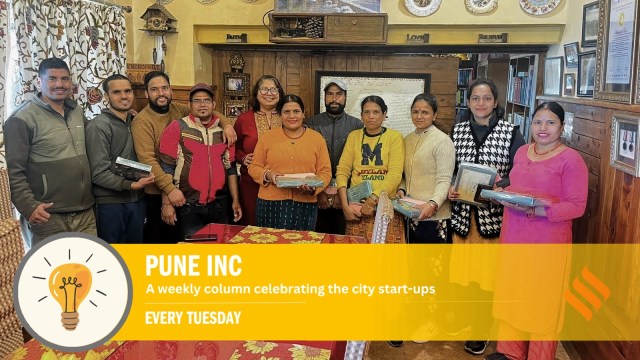Click here to join Express Pune WhatsApp channel and get a curated list of our stories
Pune Inc: How a couple moved to the Himalayas and became one of India’s homestay pioneers
Amarjeet Kudle and his wife, fellow hotelier Sunita Kudle, set up the homestay, La Villa Bethany, against the green landscape of Landour, Uttarakhand, in May 2011. It became one of the first businesses to register under the Incredible India Homestay Scheme launched in October 2010.

More than two centuries ago, the poet William Blake wrote, “Great things are done when men and mountains meet; this is not done by jostling in the street.” In the misty, green landscape of Landour, Uttarakhand, a hotel entrepreneur from a bustling peth area of Pune realises each day that he has taken the right kind of risk to set up a business – and his life – under the gaze of the changeless Himalayas rather than a familiar, fast-moving city. In the process, he has shown that it is possible to marry enterprise with serendipity.
Amarjeet Kudle and his wife, fellow hotelier Sunita Kudle, had not wanted to raise their infant daughter in a metropolitan city. They wanted to give her an upbringing rooted in a small and quiet place. The couple was on holiday in Landour, Mussoorie, in November 2009, when they came across “this very beautiful and quaint 106-year-old house” that was available on the block.
The house had been built by a 27-year-old medical missionary during the colonial era. “We didn’t have the bandwidth to buy so we shared our vision for the property with the religious organisation that owns it, and they agreed to lease it to us for 33 years,” says Amarjeet. “We decided to quit our jobs and move into the mountains, to the Himalayas,” he adds.
With this property, La Villa Bethany, the Kudles became pioneers; one of the first businesses to register under the Incredible India Homestay Scheme, which the Government of India launched in October 2010. The Kudles wanted to offer a slice of the tranquility that they had found in the hills to visitors from across the world without disrupting the historic charm of Landour.
A niche market
From its start in May 2011, La Villa Bethany carved out its revenue model as carefully as it refurbished its interiors and fashioned its aesthetics. “We try to attract like-minded people who will respect the environment. They will value the sanctity and privacy of the other guests who are staying, appreciate the surroundings and Landour’s history as a convalescent depot for British officers who were suffering from tropical diseases, and be curious about why the town is called the Peanut Butter Capital of India,” says Amarjeet.
It was a tall order to sustain a fledgling business without opening up to commercial tourists from Delhi and Amritsar, among others. But, the Kudles reached the right people. The niche traveller – including a lot of single women – gravitated towards the Enid Blyton-esque appeal of the property and the bow to JRR Tolkien in The Hobbit Home and Uncle Tom’s Cabin in the log cabin. House guests eat at least one meal together at the dining table, where strangers become friends. La Villa Bethany’s insistence on solar energy for cooking and heating water and its 80,000 litre capacity of rain water harvesting (that is being increased) strikes a chord with guests. The homestay is not only booked but also winning awards globally.
Today, the Kudles has eight homestays in a 25 km radius, such as Purkul, Dhanaulti, and Buranskhanda. When the business started, procurement used to be a challenge but e-commerce has solved that. What remains a task is to get labour in a region where communities are small and people value respect and dignity.
“If an entrepreneur develops a reputation for being difficult or hostile, local people would not want to work for you. The mountain teaches you oodles of patience. The thumb rule is that the mountains don’t change for you; you have to change for the mountains. You have to give in to their pace; you have to slow down,” says Amarjeet. Though he visits Pune regularly, he looks forward to returning. “I am a ghati who got promoted to being a pahadi,” he says.
Click here to join Express Pune WhatsApp channel and get a curated list of our stories













